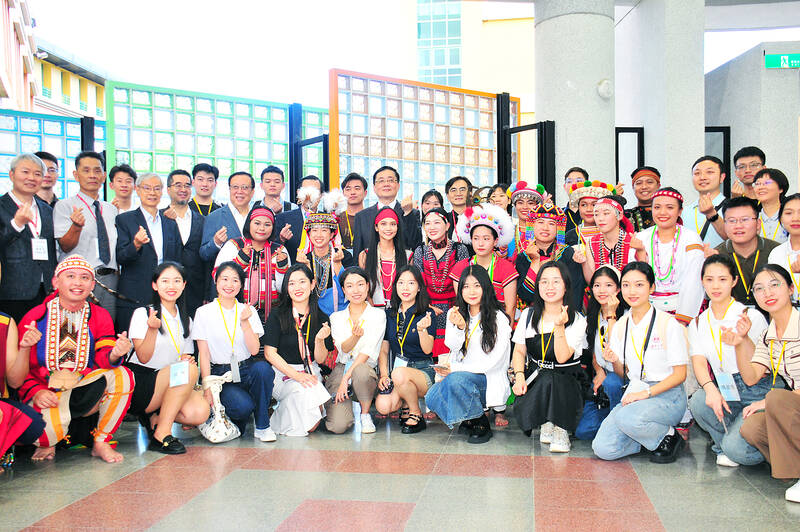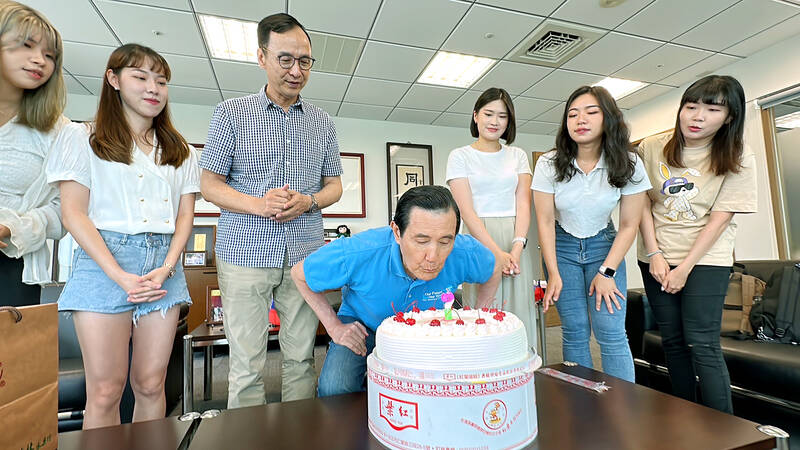Earlier this year former president Ma Ying-jeou (馬英九) lead a delegation to the People’s Republic of China (PRC), proclaiming for the millionth time that the people on both sides of the strait are “Chinese” and arguing for “peace.” This month, he lead an “exchange” program of students and teachers from the PRC to Taiwan to visit major tourist sites and have exchanges with students.
Ma said in his application to the government that the purpose of the trip was that the PRC participants “would learn about the local culture and people of Taiwan, and pass on positive messages to promote the better development of cross-strait relations.”
Note that, for Ma, Taiwan has only “local culture.” It has long been his policy to treat Taiwan’s unique culture as a subset of Chinese culture. Ironically, the party is visiting Sun Moon Lake (日月潭) and Jioufen (九份), two sites whose modern configuration is a bequest of Japanese colonialism, one of the many sources of Taiwan’s difference.

Photo: Hua Meng-ching, Taipei Times
‘UNITED FRONT’ WORK
The final group, approved by the government, consisted of 37 teachers and students from five universities in China. A legislator from the Democratic Progressive Party (DPP) quoted in the Taipei Times said last month that: “Our understanding is that some of the students were chosen in their early years at universities by Chinese Communist Party (CCP) officers at each school to be groomed for party membership.”
These contentions probably have some basis in fact, since there is no way random students and teachers from the PRC would ever be permitted to visit Taiwan in a group like this. As John Dotson noted in an excellent piece published in April by the Global Taiwan Institute, these exchanges are “carefully controlled and stage-managed by organizations within the CCP’s ‘united front work’ (統戰工作) bureaucracy. Within this framework, ‘youth exchanges’ (青年交流) are a major focus of united front work.”

Photo courtesy of the KMT
Since this is an obvious “united front” operation against Taiwan, the phrase “better development of cross-strait relations” can only mean movement toward the annexation of Taiwan. This phrase is a common high-sounding euphemism: whenever the words “cross-strait progress” or similar are invoked, one should ask “toward what end?”
Less often challenged is Ma’s absurd claim that the students learning about the “local culture and people of Taiwan” will promote better relations. It seems almost axiomatic, one widely repeated by commentators, and yet it is utter nonsense.
Consider: it’s 2023 and there are over 300,000 wives from the PRC married to local men. Some of them have even formed their own pro-PRC political party. Did they communicate nothing about the PRC to locals? Taiwan’s universities once hosted thousands of PRC students as well.
Consider too: millions of Taiwanese have lived, worked, run factories and businesses and toured in the PRC. Remember when the Hong Kong-Taipei air route was the busiest on earth? There’s a large population of Taiwanese expats there today, in addition to people working temporarily. Tens of billions in trade takes place annually.
Taiwanese have been visiting China since the 1990s in large numbers, but family visits have been permitted since 1987. That decision, as several scholars have noted, was the moment Taiwanese began to realize how deeply different the two societies were, a key factor in the democratic and culture shifts of the 1990s.
All these Taiwanese know China well.
Even if no one ever crossed the strait, Taiwanese would still know China intimately. The media reports on the PRC incessantly. PRC entities advertise on most major social media platforms, and own many of the social media that Taiwanese use daily, including shopping and video platforms. Taiwanese gamers play an enormous variety of PRC-made video games, through which they interact with official interpretations of Chinese history and culture, along with innumerable PRC citizens. Taiwanese encounter PRC nationals as they travel, do business and attend universities all over the world.
This experience calls into question the unspoken assumption of such exchanges that if the two sides know each other better, the tensions will ease. Reality is just the opposite. The more the Taiwanese see of the PRC, the less they want to be part of it. Witness the recent exodus of Taiwanese from the PRC in the wake of the horrible lockdowns and the increasingly stringent security state.
UNFAVORABLE VIEWS
They are hardly alone. A widely-cited Pew poll released on Wednesday showed that Americans of Chinese origin had extremely unfavorable views of China, unlike other immigrant groups who generally held their homelands in high regard. Chinese regularly emigrate to freer countries.
Of course, Hong Kong residents are now voting with their feet, with large numbers either leaving or looking for a way out. Hong Kong is often cited as an analogue of Taiwan’s future.
Nor can the PRC be said to be ignorant of Taiwan. They have similarly wide contacts with Taiwanese. Taiwanese and PRC researchers study every aspect of each other’s culture, politics, economy and military. The two sides know each other well.
All these intimate, variegated contacts of Taiwanese with the PRC have taken place even as the PRC has ramped up tensions with Taiwan and built up its military for the last two decades. It is not difficult to see that mutual copious, fine-grained knowledge has not lead to reductions in tensions. Quite the opposite.
People-to-people exchanges cannot reduce tensions because tensions are caused by the desire of CCP elites to kill Taiwanese (and their own people) to annex Taiwan. When those decisions change, tensions will ease.
Ma’s reasonable-sounding excuses for the “exchange” trip must be viewed in that light. Ma does not need to engage in stunts to stay relevant politically as he remains a potent force within the Chinese Nationalist Party (KMT) — his hatchet man, former KMT secretary-general King Pu-tsung (金溥聰), is the party’s presidential campaign manager. He certainly knows his trip will have no effect on the PRC-Taiwan relationship. Is he openly leading a training trip for future Taiwan experts of the PRC, helping them to cultivate contacts and spread disinformation?
Surely he must know that this exchange is merely another “united front” operation to the PRC. In other words, it sure looks like just another indicator of the willingness of the KMT leadership to front for CCP interests in Taiwan.
Notes from Central Taiwan is a column written by long-term resident Michael Turton, who provides incisive commentary informed by three decades of living in and writing about his adoptive country. The views expressed here are his own.

Growing up in a rural, religious community in western Canada, Kyle McCarthy loved hockey, but once he came out at 19, he quit, convinced being openly gay and an active player was untenable. So the 32-year-old says he is “very surprised” by the runaway success of Heated Rivalry, a Canadian-made series about the romance between two closeted gay players in a sport that has historically made gay men feel unwelcome. Ben Baby, the 43-year-old commissioner of the Toronto Gay Hockey Association (TGHA), calls the success of the show — which has catapulted its young lead actors to stardom -- “shocking,” and says

The 2018 nine-in-one local elections were a wild ride that no one saw coming. Entering that year, the Chinese Nationalist Party (KMT) was demoralized and in disarray — and fearing an existential crisis. By the end of the year, the party was riding high and swept most of the country in a landslide, including toppling the Democratic Progressive Party (DPP) in their Kaohsiung stronghold. Could something like that happen again on the DPP side in this year’s nine-in-one elections? The short answer is not exactly; the conditions were very specific. However, it does illustrate how swiftly every assumption early in an

Inside an ordinary-looking townhouse on a narrow road in central Kaohsiung, Tsai A-li (蔡阿李) raised her three children alone for 15 years. As far as the children knew, their father was away working in the US. They were kept in the dark for as long as possible by their mother, for the truth was perhaps too sad and unjust for their young minds to bear. The family home of White Terror victim Ko Chi-hua (柯旗化) is now open to the public. Admission is free and it is just a short walk from the Kaohsiung train station. Walk two blocks south along Jhongshan

Francis William White, an Englishman who late in the 1860s served as Commissioner of the Imperial Customs Service in Tainan, published the tale of a jaunt he took one winter in 1868: A visit to the interior of south Formosa (1870). White’s journey took him into the mountains, where he mused on the difficult terrain and the ease with which his little group could be ambushed in the crags and dense vegetation. At one point he stays at the house of a local near a stream on the border of indigenous territory: “Their matchlocks, which were kept in excellent order,